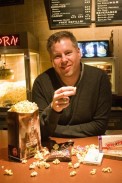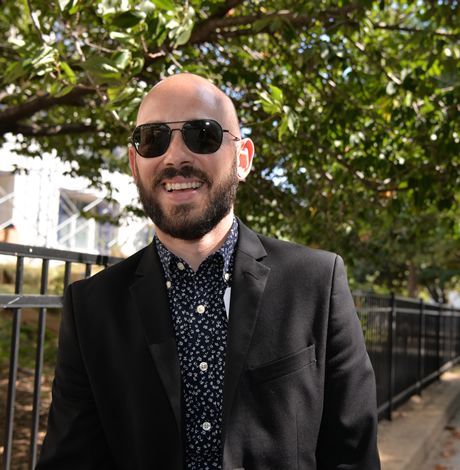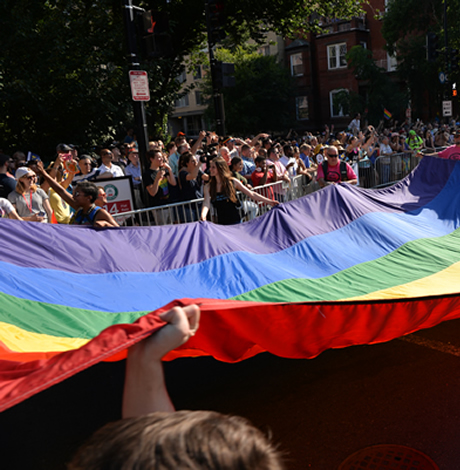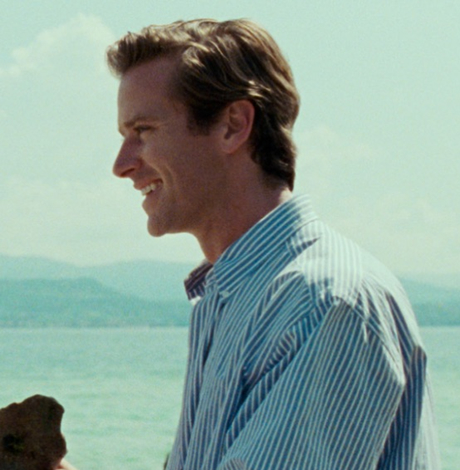Arts & Entertainment
Film, food and fun
D.C. Shorts kicks off ninth annual festival Thursday
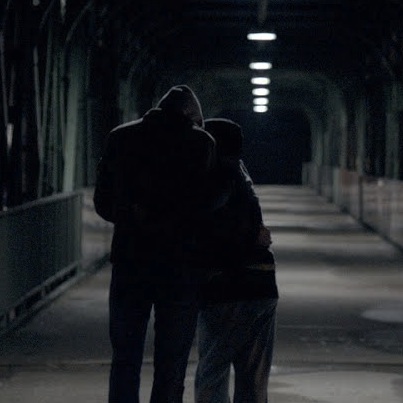
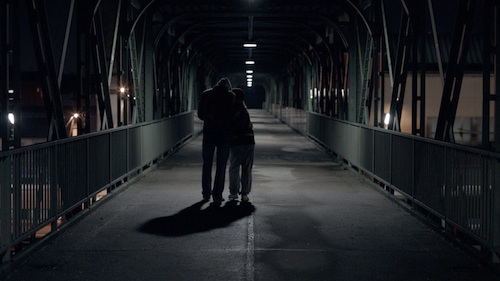
A scene from ‘Hatch,’ a 19-minute LGBT-themed drama directed by Christoph Kuschnig from Austria about two couples forced to make hard decisions on a wintry night. It’s part of ‘Showcase 10,’ a series of films that will be shown on Sept. 8 and 10 at E Street Cinema as part of the D.C. Shorts Film Festival. (Photo courtesy D.C. Shorts)
The D.C. Shorts Film Festival
September 6-16
Various venues
Ticket prices start at $12 and include an online only option
The numbers behind the ninth annual D.C. Shorts Film Festival are staggering: 140 films under 20 minutes long, 27 countries, four venues, eight chefs, 16 showcases, 11 days, five parties and six screenplays staged by local actors. Luckily, Jon Gann and his talented colleagues have it under control and their excellent website guides audience members easily through the festival.
Gann, the openly gay founder and director of the Festival, became interested in filmmaking when he became disenchanted with his work in media relations.
“I owned a graphic design firm for many, many years and I was tired of producing stuff that I thought was great that clients thought was schlock and stuff I thought was schlock that they thought was great, so I decided to go to film school,” he says.
His most notable film to date is the award-winning “Cyberslut,” a nine-minute confession of an unnamed man obsessed with finding sex on the Internet. In intimate and riveting detail, the film tracks his fascination of the online hunt, the frequent disappointment at the first meeting and the occasional ecstatic encounter that sends him back to the computer to hunt again. As the narrator wryly notes, “a computer lets you make more mistakes faster than any other invention in human history, with the possible exception of handguns and tequila.”
Gann’s experience with film festivals (“Cyberslut” has had 47 screenings worldwide, making it one of the most successful gay-themed short films) inspired him to create a different kind of film festival.
“I travelled to festivals all over the world and that’s when I realized that many festivals were about food and parties and sponsors but not necessarily about films or filmmakers,” Gann says. “That’s when I said I need to do something that’s different. The focus of my festival was going to be on filmmakers and if I did that right, then the food and the money and the parties would come.”
Gann has established a system to make the Festival a supportive environment for filmmakers.
“We give feedback to all the filmmakers who enter, whether they make it into the festival or not. We allow them to see their scores and the judges’ comments. That has helped some filmmakers recraft their final edit to make it tighter.”
Gann also realized he wanted to focus on short films (less than 20 minutes). He thinks that “there’s a hunger for really good short content. If Internet use is any indication, people like to see a story in a few minutes.” He adds that short films are also a great way for fledgling artists to learn their craft.
“As a filmmaker,” he says, “if you’re able to tell a succinct story that grabs the audience’s attention and is emotionally gripping in a few minutes, then you know what you’re doing as a storyteller. And that to me is impressive.”
So, in 2004, Gann started the D.C. Shorts Festival, financed largely with money from his own checking account. The first year, 75 films were submitted and 32 films were presented in three screenings for enthusiastic audiences. Looking back on the experience, he says, “It made me a nervous wreck but the whole thing was a big success. We sold out all the tickets and had to turn people away, which was amazing. And it’s grown from there.”
Today, D.C. Shorts is the largest short film festival on the East Coast.
There were more than 850 submissions for the 2012 Festival. After a rigorous selection process, 140 movies were chosen for screening. The films, with run times ranging from one to 20 minutes, are being presented in 16 showcases. Each showcase lasts around 90 minutes. An interactive online tool called “The Film Finder” helps audience members select the programs they’re most interested in seeing. Browsers can sort by showcase, country of origin, genre (documentary, animation, horror, comedy, drama and so on) and interest area (including LGBT, local films and celebrities).
The showcases will be presented at four venues throughout the D.C. region, including the E Street Cinema, the U.S. Navy Memorial, the Atlas Performing Arts Center and the new Angelika Film Center in Fairfax.
In addition to the showcases, there are a variety of other events for filmmakers and film fans to enjoy. For example, patrons can enjoy:
• Free lunch time screenings at the E Street Cinema in downtown D.C.
• Free family and teen screenings at the new Angelika Film Center in Virginia
• A screenplay competition where six scripts (selected from 185 submissions) are given a staged reading by local actors and directors. The winner will receive a cash prize ($1,000 when the award is made and $1,000 when the film is completed) and a slot in the 2013 Festival.
• Free seminars for aspiring and practicing filmmakers
• “The Best of DC Shorts” showcase which features movies selected by audiences during the festival’s opening weekend
• An Awards Brunch with accolades from the festival jury, the festival director, audience members, and a peer award from the filmmakers themselves
• And, a variety of legendary parties that offer “food and drink and DJs and dancing and lots of chances to meet filmmakers.”
Gann adds that that this year’s festival has an emphasis on films about food and includes partnerships with area restaurants.
“We have a big food-film program this year,” he says. “We’ve paired eight films with local chefs who’ve prepared special dishes based on those films. At those films, you can actually sample the food at the end of the screening.”
For example, “Murder Mouth” by first-time Australian filmmaker Madeleine Parry is a documentary showing how, “Madeleine decides that unless she kills it, she can’t eat it.” The film is paired with Ed Witt’s recipe for Crostini with Lamb Tartare, which will be served to audience members after select screenings. Like Maddie in the film, the chef from 701 argues that, “Modern day carnivores have become so disconnected from their food that they are unable to identify it without the labels from the grocery store.”
Queer themes
Several selections in this year’s Festival have LGBT storylinesThe D.C. Shorts Film Festival includes 10 films with explicitly LGBT content. They are sprinkled throughout the showcases, often in interesting combinations with other films.
The most delightful, a modern day fairy tale called “The Maiden and the Princess,” is actually part of the free Family Showcase on Sept. 15 at the Angelika Film Center. Directed by American filmmaker Ali Scher, this charming film tells the story of Emmy, who is teased by her classmates and rebuked by her parents when she kisses another girl.
Luckily Hammond, a narrator with the Grand High Council of Fairy Tale Rules and Standards intervenes. He transports himself (in fairy godmother drag) and Emmy into a musical fairy tale that reassures Emmy that her feelings are perfectly normal and that convinces Hammond’s stodgy superior to let him put the “fairy” back in fairy tale.
Scher was very clear about her aim in making the film, saying “My goal with this project is to cut through the silence and facilitate honest communication between children and parents about sexual orientation.” She affirms that she made the movie so that “no kid ever has to feel ashamed of who they are. We as a society need to encourage individuality in children, even if it means exposing them to things we are afraid of.”
A much darker story is told in “Hatch” by Austrian director Christopher Kuschnig, who won a student Oscar for the film. “Hatch” tells the stories of two couples whose lives intersect on a wintry night in Vienna and the baby whose fate will be changed by the decisions they make. Kuschnig succeeds in using an innovative narrative and visual style to capture both the inner dynamics of each couple and the broader social implications of their desperate acts.
“‘Hatch’ is much more than the story of one couple’s wrenching decision and another’s criminal act,” he says. “I was particularly interested in each couple’s distinct dynamics and how these events on this particular night could challenge their assumptions of each other, and therefore alter their relationships and eventually their lives.”
Some of the other LGBT films in the Festival are “The Queen of My Dreams,” a Bollywood influenced take on a young lesbian’s coming-out story; “Cobra,” which takes a grieving father from the funeral of his estranged son to the bar where his son performed; and “The Gay Who Wasn’t Gay Enough,” a hard-hitting take on conformity in the gay community. — BRIAN T. CARNEY

Team DC, the umbrella organization for LGBTQ-friendly sports teams and leagues in the D.C. area, held its annual Night of Champions Awards Gala on Saturday, April 20 at the Hilton National Mall. The organization gave out scholarships to area LGBTQ student athletes as well as awards to the Different Drummers, Kelly Laczko of Duplex Diner, Stacy Smith of the Edmund Burke School, Bryan Frank of Triout, JC Adams of DCG Basketball and the DC Gay Flag Football League.
(Washington Blade photos by Michael Key)




















The 2024 National Cannabis Festival was held at the Fields at RFK Stadium on April 19-20.
(Washington Blade photos by Michael Key)
















Covering the @NatlCannaFest at RFK Stadium for @WashBlade . Stop by the LGBTQ+ booth and pick up a paper if you are here. pic.twitter.com/is7hnsaPns
— Michael Patrick Key (@MichaelKeyWB) April 20, 2024
Theater
‘Amm(i)gone’ explores family, queerness, and faith
A ‘fully autobiographical’ work from out artist Adil Mansoor

‘Amm(i)gone’
Thorough May 12
Woolly Mammoth Theatre
641 D St., N.W.
$60-$70
Woollymammoth.net
“Fully and utterly autobiographical.” That’s how Adil Mansoor describes “Amm(i)gone,” his one-man work currently playing at Woolly Mammoth Theatre.
Both created and performed by out artist Mansoor, it’s his story about inviting his Pakistani mother to translate Sophocles’s Greek tragedy “Antigone” into Urdu. Throughout the journey, there’s an exploration of family, queerness, and faith,as well as references to teachings from the Quran, and audio conversations with his Muslim mother.
Mansoor, 38, grew up in the suburbs of Chicago and is now based in Pittsburgh where he’s a busy theater maker. He’s also the founding member of Pittsburgh’s Hatch Arts Collective and the former artistic director of Dreams of Hope, an LGBTQ youth arts organization.
WASHINGTON BLADE: What spurred you to create “Amm(i)gone”?
ADIL MANSOOR: I was reading a translation of “Antigone” a few years back and found myself emotionally overwhelmed. A Theban princess buries her brother knowing it will cost her, her own life. It’s about a person for whom all aspirations are in the afterlife. And what does that do to the living when all of your hopes and dreams have to be reserved for the afterlife?
I found grant funding to pay my mom to do the translation. I wanted to engage in learning. I wanted to share theater but especially this ancient tragedy. My mother appreciated the characters were struggling between loving one another and their beliefs.
BLADE: Are you more director than actor?
MANSOOR: I’m primarily a director with an MFA in directing from Carnegie Mellon. I wrote, directed, and performed in this show, and had been working on it for four years. I’ve done different versions including Zoom. Woolly’s is a new production with the same team who’ve been involved since the beginning.
I love solo performance. I’ve produced and now teach solo performance and believe in its power. And I definitely lean toward “performance” and I haven’t “acted” since I was in college. I feel good on stage. I was a tour guide and do a lot of public speaking. I enjoy the attention.
BLADE: Describe your mom.
MANSOOR: My mom is a wonderfully devout Muslim, single mother, social worker who discovered my queerness on Google. And she prays for me.
She and I are similar, the way we look at things, the way we laugh. But different too. And those are among the questions I ask in this show. Our relationship is both beautiful and complicated.
BLADE: So, you weren’t exactly hiding your sexuality?
MANSOOR: In my mid-20s, I took time to talk with friends about our being queer with relation to our careers. My sexuality is essential to the work. As the artistic director at Dreams of Hope, part of the work was to model what it means to be public. If I’m in a room with queer and trans teenagers, part of what I’m doing is modeling queer adulthood. The way they see me in the world is part of what I’m putting out there. And I want that to be expansive and full.
So much of my work involves fundraising and being a face in schools. Being out is about making safe space for queer young folks.
BLADE: Have you encountered much Islamophobia?
MANSOOR: When 9/11 happened, I was a sophomore in high school, so yes. I faced a lot then and now. I’ve been egged on the street in the last four months. I see it in the classroom. It shows up in all sorts of ways.
BLADE: What prompted you to lead your creative life in Pittsburgh?
MANSOOR: I’ve been here for 14 years. I breathe with ease in Pittsburgh. The hills and the valleys and the rust of the city do something to me. It’s beautiful, it’ affordable, and there is support for local artists. There’s a lot of opportunity.
Still, the plan was to move to New York in September of 2020 but that was cancelled. Then the pandemic showed me that I could live in Pittsburgh and still have a nationally viable career.
BLADE: What are you trying to achieve with “Amm(i)gone”?
MANSOOR: What I’m sharing in the show is so very specific but I hear people from other backgrounds say I totally see my mom in that. My partner is Catholic and we share so much in relation to this.
I hope the work is embracing the fullness of queerness and how means so many things. And I hope the show makes audiences want to call their parents or squeeze their partners.
-

 South America3 days ago
South America3 days agoDaniel Zamudio murderer’s parole request denied
-

 Maryland4 days ago
Maryland4 days agoMontgomery County police chief discusses arrest of trans student charged with planned school shooting
-

 Commentary5 days ago
Commentary5 days agoWorld ‘isn’t much different today’
-

 Theater3 days ago
Theater3 days ago‘Amm(i)gone’ explores family, queerness, and faith

